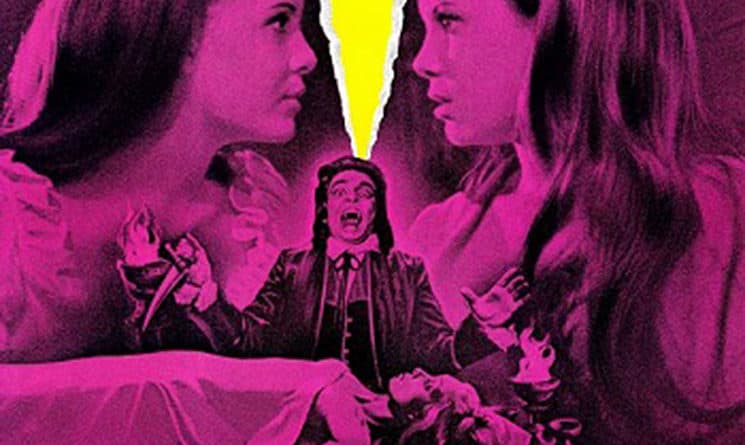“Twins of Evil” (Hammer Films, 1971)
Starring: Madeleine and Mary Collinson, Peter Cushing, David Warbeck, and Damien Thomas
Director: John Hough
The plot: Recently orphaned teenage twins Maria and Frieda (Mary and Madeleine Collinson, respectively) move to Karnstein in Central Europe to live with Uncle Gustav (Cushing), a major puritan and fanatical witch-hunter who’s a total drag. Meanwhile, Count Karnstein (Thomas), a politically-connected Satanist, indulges in evil rites and brings Frieda under his spell. Maria falls in love with a handsome young teacher, Anton (Warbeck). Tragedy strikes when the villagers, eager to destroy the Count and his vampire minions, confuse the girls’ identities.
Why it’s good: Hammer squeezed the last possible drops out of John Sheridan Le Fanu’s 1872 vampire tale “Carmilla,” generating three films from this slight Gothic novella. Much of that comes from the lesbian undertones Le Fanu hinted at and which Hammer, a century later, managed to make the centerpiece of this and two other films. It’s hard to imagine now, but The New York Times gave “Twins of Evil” a serious review. It’s a credit to Hammer’s output, and “Twins,” along with 1972’s “Demons of the Mind” and 1961’s “Curse of the Werewolf,” are among the standouts in the studio’s output. Frequent Hammer player Peter Cushing gives a fine performance, the script is always right on point, and the direction polished. The Collinsons’ sisters status as Playboy’s first, and only, twin Playmates in 1970 probably had more to do with the film’s success than anything else.
Should I watch it? The world in which Hammer Films flourished is as distant now as the America that so cherished Westerns in film and television for more than a half century. Hammer’s model is hopelessly dated: the sets and costumes look simultaneously lavish and cheap, the acting is hammy, the dialogue heavy-handed, the sex gratuitous, and so on. And yet, the utter conviction with which Hammer’s artists went about their business inspires an admiration and sentimental nostalgia in this more jaded age. Exploitation? Certainly, but without a whiff of cynicism. Films with preposterous titles like “Dracula Has Risen from the Grave” or “Vampire Circus” were never taken seriously, but each Hammer film is stamped with a sort of integrity — a company of artisans, with limited talent and resources, doing their best with enthusiasm and good cheer. Despite those limited materials, there’s always an unsettling, unholy fairy tale aspect at the forefront of a Hammer film. Hammer’s films are all available on DVD, but their long-gone spirit of innocence dwells in the same time capsule that includes Sean Connery as 007, Playboy (when it was actually sophisticated), Julie London, Stan Getz, Ross Macdonald, Lenny Bruce, Terry Southern, and the Galloping Gourmet. They were all of their time, and we shall not see their like again.

